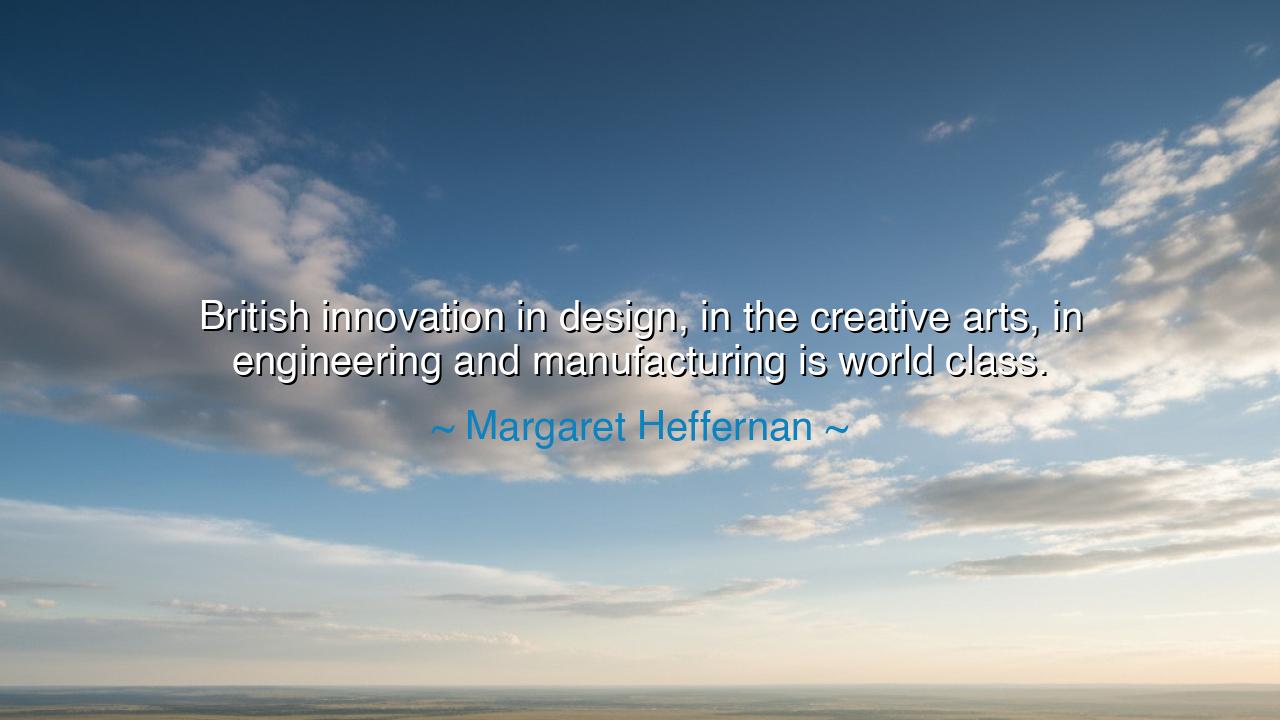
British innovation in design, in the creative arts, in
British innovation in design, in the creative arts, in engineering and manufacturing is world class.






“British innovation in design, in the creative arts, in engineering and manufacturing is world class.” — Margaret Heffernan
Thus spoke Margaret Heffernan, the thinker and leader who has long sought to awaken in others the courage to create, to question, and to build. In this declaration, she honors not only a nation’s achievement but a universal truth — that innovation, when nurtured by imagination and discipline, becomes a force that transcends borders and time. When Heffernan says, “British innovation in design, in the creative arts, in engineering and manufacturing is world class,” she is not simply praising a land; she is invoking the spirit of human excellence — that rare and noble flame that turns vision into reality.
The origin of these words lies in Heffernan’s lifelong admiration for the ingenuity and resilience that have long defined Britain’s creative spirit. Born in the United States but having made her home in the United Kingdom, she observed how a small island, shaped by centuries of challenge and change, became a cradle of ideas that changed the world. From the Industrial Revolution, when smoke and steam gave birth to modern industry, to the digital age, when creativity flows through circuits and screens, the British imagination has continually reinvented itself. Heffernan’s statement is both recognition and reminder: recognition of past triumphs, and reminder that the strength of a people lies in their power to create anew.
For truly, the story of British design and innovation is one of vision meeting perseverance. Consider Isambard Kingdom Brunel, the engineer who dreamed in iron and steam, who bridged rivers and tunneled through mountains, whose ships carried nations across the seas. His mind was a furnace of invention, and through it, the modern world took shape. Or think of Charles Rennie Mackintosh, whose architecture and furniture whispered poetry in wood and glass, blending art with utility. These were not mere craftsmen — they were builders of the possible, men and women who turned imagination into infrastructure, artistry into legacy.
Nor is this spirit confined to the past. In the creative arts, from the music of The Beatles to the designs of Alexander McQueen, from the films of Ridley Scott to the architecture of Norman Foster, the British mind continues to astonish the world. Their work embodies that unique balance of boldness and restraint, elegance and experimentation. Each creation reflects not only skill but soul, not only precision but passion. It is this combination — intellect married to artistry, curiosity guided by craft — that Heffernan calls “world class.” For true excellence is not measured by competition alone, but by the ability to inspire humanity itself.
Yet Heffernan’s words also carry a deeper challenge. To call innovation “world class” is not to rest upon laurels, but to accept the duty of continuing greatness. For innovation is not a monument; it is a living current. It demands courage, curiosity, and the humility to fail. In her writings and speeches, Heffernan warns that true progress cannot thrive in comfort or conformity. It grows only in the soil of collaboration, diversity, and creative courage. The achievements of the past are torches, not trophies — lights that must be carried forward by new generations willing to risk, to imagine, to build again.
The lesson is this: innovation, wherever it arises, is not a gift bestowed on the few, but a calling shared by all. Whether you design a bridge or a poem, a machine or a melody, let your work bear the mark of originality and care. Study what has come before, honor it, but do not be bound by it. Seek always to make something worthy of the world’s gaze — not for glory, but for contribution. For the greatest nations and the greatest individuals are those who understand that creation is service: to beauty, to progress, and to the human spirit.
So remember the teaching of Margaret Heffernan: “British innovation in design, in the creative arts, in engineering and manufacturing is world class.” It is a song of pride, yes, but also of purpose — a call to continue the work of imagination that shapes civilization itself. For in the end, innovation is not born of nations but of souls. Wherever a mind dares to dream, wherever hands strive to bring that dream to life, there the world is renewed. Let each of us, in our craft and calling, create with courage and with excellence worthy of the ages — so that one day, too, our work may be counted among the world’s finest, and our legacy endure beyond our time.






AAdministratorAdministrator
Welcome, honored guests. Please leave a comment, we will respond soon